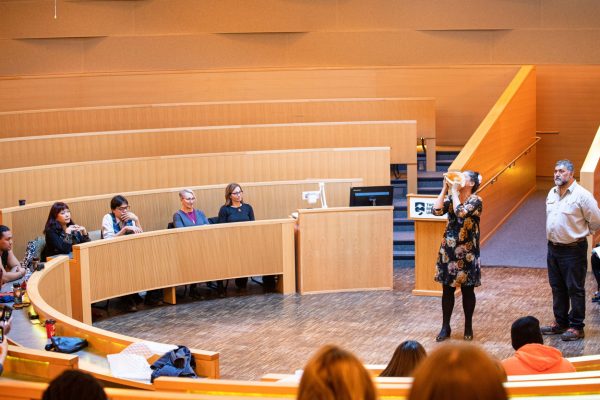Indigenous delegations from universities in Australia, New Zealand and Canada are discovering they have much in common, despite the distances between them.
Music, laughter and the spirit of friendship filled c7ístkten̓ (The Pithouse) in the Brown Family House of Learning as delegates from New Zealand and Australia celebrated four days of hospitality and cultural sharing with their Thompson Rivers University hosts.
Faculty of Education and Social Work Dean Airini lifted a conch shell to her lips and blew, a long, reverberating sound from the south Pacific Ocean where she grew up. Looking at Indigenous students and staff from universities in Australia and New Zealand, she smiled and said, “It moves me to see those here who know my ocean.”
This was the second year that TRU has exchanged Indigenous delegations with those from universities in Australia, and the first year representatives from New Zealand joined the mix during the mid-February visit. TRU became involved as part of The Coyote Project, an initiative to accelerate indigenization at the university and improve Indigenous student outcomes.
Airini said the exchange is a chance to share experiences, learn from other Indigenous cultures and strengthen each other.
“It’s important because of what it is that we bring with us, what it is that’s made possible by being together and what it is we can do from here,” she said. “All of us in this room, we all have a sense of being called to action.”

Education and Social Work Dean Airini blows a conch shell at the closing ceremony of a four-day visit from Indigenous delegates from Australia and New Zealand.
Krista Henare, Māori student achievement manager with the University of Waikato in New Zealand, said TRU’s warm welcome and commitment to support local Indigenous peoples and culture stood out for her.
“The hospitality has been impactful here.”
At the same time, she saw news reports from other parts of BC and Canada about issues around reconciliation.
Henare, who works in student achievement, said it’s not so different in New Zealand.
“We have a lot of the same issues,” she said.
This exchange is particularly important to TRU because Indigenous students are often underrepresented in international experiences, said Donna McGrath with TRU World. TRU’s international team is an emerging leader in Canada for working proactively to connect Indigenous students with Indigenous scholars and students globally. Exchanges have been inbound and outbound, in a unique collaboration between universities in USA, Australia, New Zealand and Canada. The TRU students who have participated developed a better understanding of what it means to be part of a global community of 370 million Indigenous peoples, along with deepening their own identity and cultures, and their understanding of other cultures.
Making the most of available funding, the first outbound TRU Indigenous World delegation was one student and one Elder; the second delegation was one student and one staff member. There is hope to do fundraising so five students can go in future.
She described the experience for those two students as transformational.
“It made them want to learn so much more about their own culture,” McGrath said.
Tina Matthew, executive director of Indigenous Education, said the Indigenous exchange builds collaboration among institutions, and also across TRU itself.
“It brings a lot of faculties together,” she said. “There’s a lot of cross-cultural learning that takes place. … We all connected on many different levels.”
University of Sydney PhD student David Meharg is researching chronic lung disease in Aboriginal people in Australia, New Zealand, the USA and Canada. The exchange helped confirm information in his report first-hand and surprised him in that there were so many commonalities.
“I didn’t expect it to be so deeply impactful,” he said. “We are all Indigenous peoples from across the world. As we are on the journey of sharing, it’s still important to stay grounded about who we are and where we’re from.”
Meharg appreciated the warmth and welcoming shown to the 14-member delegation, starting with the home-cooked meal Elder Doreen Kenoras from the Adams Lake Indian Band had ready when their airplane touched down in Kamloops.
“There has been significant hospitality shown to us and a willingness to welcome us.”
And as they shared their final gathering, TRU lecturer and Tk’emlúps te Secwépemc member Garry Gottfriedson thanked them for visiting.
“It has been a tremendous honour to have you visitors come onto our land,” he said. “In my culture, we say farewell, not good-bye. Because good-bye is forever.”

